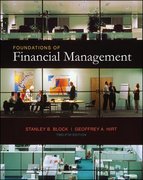Question
You are a very powerful institutional investor that holds 1 million shares of Cisco System, Inc., purchased on February 28, 2003. In researching Cisco, you
You are a very powerful institutional investor that holds 1 million shares of Cisco System, Inc., purchased on February 28, 2003. In researching Cisco, you discovered that they are holding a large amount of cash. Additionally, you are upset that the Cisco stock price has been somewhat stagnant as of late. You are considering approaching Ciscos Board of Directors with a plan to payout half of the cash the firm has accumulated, but cant decide whether a share repurchase or a special dividend would be best. Because both dividends and capital gains are taxed at the same rate (15%), at the first glance there seems to be no difference between the two options. To confirm, however, you need to run the numbers for each scenario. Assume that the current stock price is $45 and the number of shares outstanding for Ciscos stock is 5,000,000,000 shares.
1. Rather than selling all remaining shares today, now you decide to consider a longer holding period. That is, you will sell all remaining shares 5 years later rather than immediately. Assume that the stock price will grow at 10% rate per year going forward, regardless of what the starting price is today. Also assume that Cisco will pay no other dividend over the next 5 years.
a. What would be the stock price after 5 years under each scenario?
b. Calculate the after-tax liquidation proceeds from selling remaining shares 5 years
after the dividend scenario.
c. Calculate the after-tax liquidation proceeds from selling remaining shares 5 years
after the repurchase scenario.
d. Note that these liquidation proceeds are occurring at time 5 instead of time 0. Calculate the present value (PV) of the after-tax liquidation proceeds in each scenario using discount rate of 10%.
e. Compute the total after-tax proceeds ( = after-tax payout proceeds + PV of after-tax liquidation proceeds) in each scenario, and compute the difference between the two scenarios, evaluated at time 0.
f. Which scenario would you prefer now?
2. Do you think your preference changes depending on your investment horizon? If so, how?
Step by Step Solution
There are 3 Steps involved in it
Step: 1

Get Instant Access to Expert-Tailored Solutions
See step-by-step solutions with expert insights and AI powered tools for academic success
Step: 2

Step: 3

Ace Your Homework with AI
Get the answers you need in no time with our AI-driven, step-by-step assistance
Get Started


